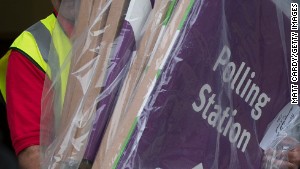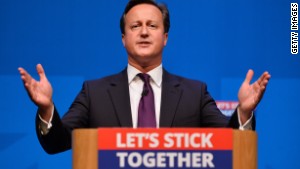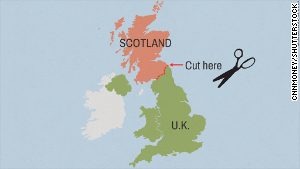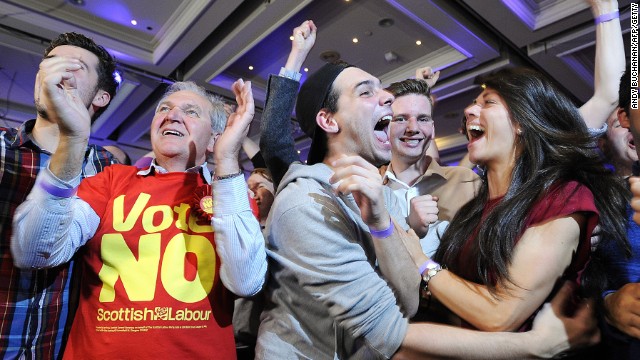Glasgow, Scotland (CNN) -- [Breaking news alert, 6:10 a.m. GMT (01:10 a.m. ET)]
British Prime Minister
David Cameron congratulates Better Together head Alistair Darling via
tweet: "I've spoken to Alistair Darling -- and congratulated him on an
well-fought campaign," while Scotland's First Minister and the leader of
the "Yes" campaign, Alex Salmond congratulates "Commonwealth city"
Glasgow on Twitter for the its overwhelming support of independence.
With all but 3 councils declared, "NO" leads 55.4% to 44.6%.
[Original story published at 12.37 p.m. ET]
Voters in Scotland made their choice Thursday -- remain part of the United Kingdom, or form their own independent nation.
With a majority -- 26 of
32 -- of councils reporting, the "No" campaign enjoy a significant lead
-- currently 1,397,078 votes for "No" to independence, and 1,176,952 for
"Yes."
With more than 2.5
million votes counted, parts of the British media seem confident that
the Unionist camp will be victorious: With more than 60% of the vote
counted, the BBC has forecast a "No" victory, meaning that Scotland
would remain part of the United Kingdom.
CNN has not called the result.
The first councils to
declare all went to the "No" campaign, as did the capital, Edinburgh,
which voted overwhelmingly to stay in the union with 123,927 for "Yes"
and 194,628 "No" votes. Argyll and Bute and Aberdeenshire also voted
"No."
Glasgow delivered a
solid win for the independence camp with 194,779 votes for "Yes," and
169,347 for "No," but lead was not big enough to overturn the "No"
camp's overall majority so far, which maintains a 8% (54% to 46%) lead
over pro-independence camp.
The majority of the
early results have been going the anti-independence camp's way. The "No"
campaign extended lead with Angus and East Dunbartonshire council
results, alongside a landslide in Dumfries and Galloway. The oil-rich
city of Aberdeen also strongly voted for the unionist camp.
The city of Dundee was the first big gain for the independence campaign, voting "Yes" with 53,620 votes for, 39,880 against.
The individual counts by
local authorities are ultimately immaterial as it is the total number
of votes countrywide that will determine the outcome.
Polls at more than 5,500
stations across all districts, from the remote highlands and islands to
the big cities of Edinburgh and Glasgow, closed at 10 p.m. local time
(5 p.m. ET). People still in line to vote at that time were allowed to
cast ballots.
High turnout
The first districts to
report turnout reported high participation -- well over 80% in most
cases -- Mary Pitcaithly, chief counting officer, announced in
Edinburgh.
Turnout in Glasgow, one of the Yes campaign's heartlands, was a relatively disappointing 75%.
More than 4.2 million people registered to vote on the question: "Should Scotland be an independent country?"
 Decision day for Scotland
Decision day for Scotland
 Expert: 'Yes' would humiliate Cameron
Expert: 'Yes' would humiliate Cameron
 Scotland votes: See the TV ads
Scotland votes: See the TV ads
 Photos: Scotland votes
Photos: Scotland votes
A vote for independence
would mean Scotland, with its population of about 5.3 million, splits
from the rest of the United Kingdom, made up of England, Wales and
Northern Ireland, in addition to Scotland.
"The people of Scotland
have engaged in this conversation," Phil MacHugh, a spokesman for the
"Yes" camp, told CNN on Thursday night. "They have really gone out
there, found out the information that they wanted to know, and made that
choice today."
Prime minister's address
British Prime Minister
David Cameron will make an address Friday morning. The content will
depend on the outcome of the vote, but in the event that Scottish voters
decide to stay in the union, Downing Street says he will refer to plans
for further redistribution of powers from the central government to the
Scottish Parliament, signed by Westminster leaders earlier this week.
The counting officer for
Edinburgh, Sue Bruce, explained just after 10 p.m. that each ballot
will be double-checked, to verify each voter's decision.
Addressing dozens of
election workers, Bruce added, "I look forward to working with you
during the course of the evening to deliver an accurate and transparent
Edinburgh count in which you and the voters of Edinburgh can have full
confidence."
Voting was brisk at one
polling station in Glasgow as the polls opened Thursday, with many
people voting on the way to work or before taking their children to
school.
Bad weather or the sheer
volume of votes cast could slow down the counting process. However, the
weather forecast appears good so far -- important when some ballot
boxes must be collected by helicopter, plane or boat from polling
stations on distant islands.
Allegations of voting
fraud were reported by Glasgow City Council, with several instances of
people turning up at voting booths in Scotland's largest city to vote,
only to be told that they had already voted.
The Council stressed
that there was never actually a situation of double voting and the
affected ballots are now being searched for and taken away.
Scotland's First
Minister Alex Salmond, who has led the pro-independence "Yes Scotland"
campaign, cast his ballot Thursday morning in the village of Strichen,
Aberdeenshire.
Labour lawmaker Alistair
Darling, who has headed the pro-union "Better Together" campaign --
backed by the main parties in Westminster -- voted in Edinburgh, while
former Prime Minister Gordon Brown, another pro-union campaigner, voted
in the town of Kirkcaldy.
For the first time, the
vote was extended to 16- and 17-year olds living in Scotland. Nearly
110,000 people younger than 18 have registered to vote.
Voters in the referendum
did not have to be British citizens; Commonwealth, Irish and EU
citizens who live in Scotland and are registered to vote there can cast a
ballot. However, Scots living outside Scotland do not have a say.
Nearly 790,000 people applied for a postal vote -- the largest volume of registration for postal votes ever in Scotland.
After the polls closed, Salmond tweeted, "This has been a remarkable day. Scotland's future truly is in Scotland's hands."

No comments:
Post a Comment